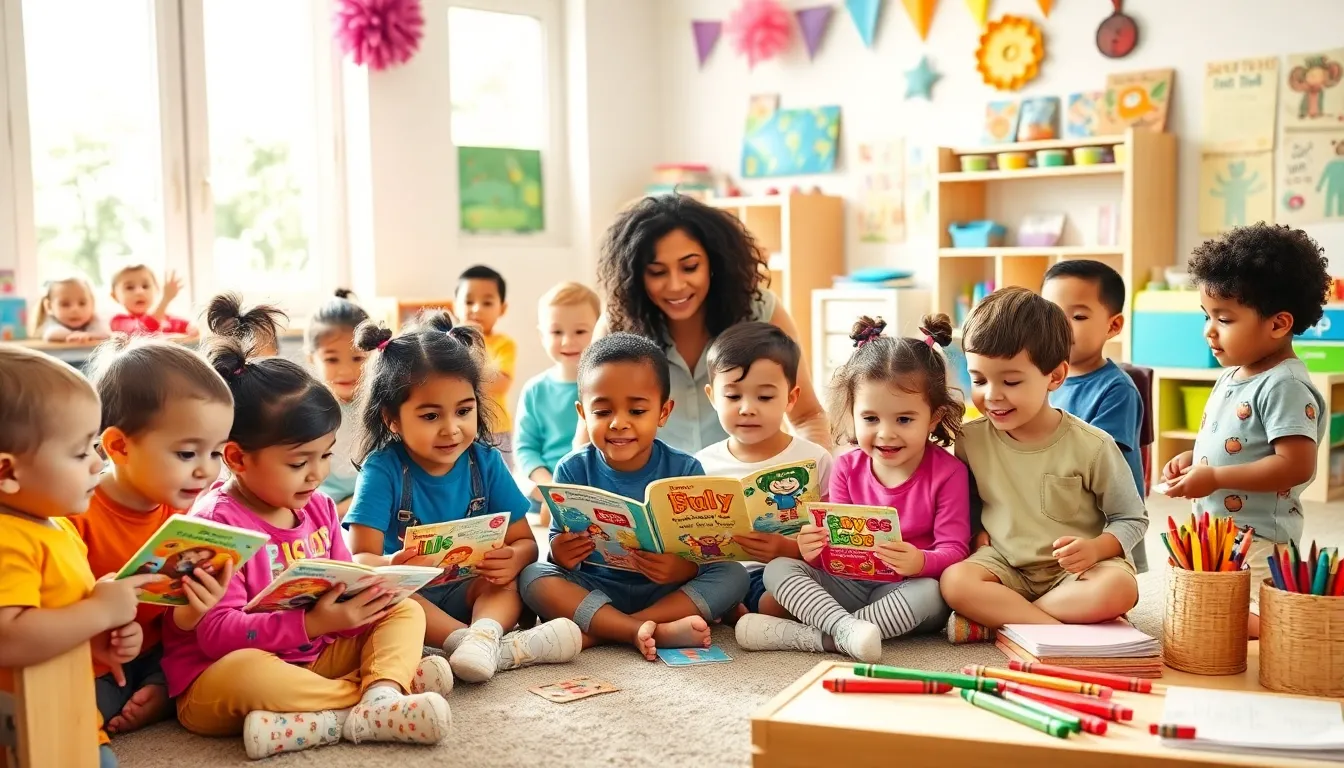Welcome to the wild world of preschool language development. Picture this: tiny humans mastering the art of communication while simultaneously wielding crayons like swords. Language is, without a doubt, one of their first adventures. Engaging preschoolers with exciting language activities can set them on a lifelong journey of exploration and expression. So, if you’re ready to transform your little chatterboxes into confident communicators, buckle up for a ride packed with fun and engaging ways to boost their vocabulary and skills.
Table of Contents
ToggleImportance Of Language Development In Preschoolers

Language development during preschool years lays the foundation for future learning. At this stage, children absorb language skills like sponges, which significantly impact their literacy development and social skills. When preschoolers learn to express their thoughts and feelings, they navigate their world with greater confidence. This development fosters healthy relationships with peers and adults, enabling them to communicate effectively.
Also, strong language skills help enhance cognitive reasoning. The more vocabulary children acquire, the better they can articulate their needs and ideas. Learning to express themselves can lead to improved academic performance as they transition into formal schooling. So, investing time in engaging language activities is not only fun but essential for their overall development.
Fun Language Activities To Enhance Vocabulary
Making vocabulary expansion enjoyable is the secret ingredient to keeping preschoolers engaged. Here are some playful activities that can boost their language skills:
- Word Games Galore: Create simple word games such as ‘I Spy’ to encourage children to identify objects around them. This game can be adapted according to themes, like colors, shapes, or animals.
- Picture Books Adventure: Jump into picture books together. Ask open-ended questions about the pictures and characters. This not only enhances their vocabulary but also sparks their imagination.
- Memory Match: Create matching cards with pictures and words. When they find pairs, encourage them to say the words aloud. This is an engaging way to reinforce new vocabulary while having fun.
- Treasure Hunts: Organize a treasure hunt where clues are written in simple sentences. As the children decipher them, they’ll enhance their reading skills and vocabulary at the same time.
Each of these activities can transform the process of learning new words into a thrilling adventure.
Interactive Storytelling Techniques
Interactive storytelling is another powerful tool for enhancing language skills. Children love stories, and incorporating interaction makes storytelling even more engaging. Here are some techniques:
Using Props
Introduce props related to the story. As the story unfolds, encourage children to pick up items, act them out, or mimic sounds. This tactile experience allows them to connect with the narrative and builds their comprehension skills.
Character Voices
When reading, use different voices for each character and invite children to join in. This interaction not only captivates their attention but also encourages them to explore new language patterns and emotions.
Story Reenactment
Once the story is concluded, allow the preschoolers to reenact it. They can use their own words to tell the story anew, which strengthens their narrative skills and boosts their confidence.
Games That Promote Language Skills
Games are fantastic for teaching language skills while keeping preschoolers engaged. Here are a few delightful options:
- Simon Says: This classic game enhances listening skills and encourages children to follow directions while learning new vocabulary through actions.
- Charades for Kids: A highly engaging game that encourages non-verbal communication while also combining motions with words. Kids have to act out different actions or animals, prompting their peers to guess the word.
- Pictionary: Draw simple pictures for words. This activity develops vocabulary recognition and encourages creativity through drawing and guessing.
- Story Cubes: Roll dice with different pictures and create stories based on the images. This fosters imaginative thinking and language skills.
Incorporating Songs And Rhymes
Songs and rhymes are not just catchy: they’re incredibly beneficial for language development. Here’s how:
- Sing Along: Incorporate songs into daily routines. Singing helps preschoolers learn new words and understand rhythm, which can enhance their speech patterns.
- Action Songs: These songs come with movements, providing a double whammy of physical engagement and linguistic learning. “Head, Shoulders, Knees, and Toes” is a classic example.
- Nursery Rhymes Repetition: Repeating nursery rhymes helps embed new vocabulary into children’s memory. Plus, the rhythm aids in their phonemic awareness, essential for reading.
Tips For Parents To Support Language Learning
Parents play a crucial role in language development. Here are some practical tips:
- Model Language Use: Encourage parents to speak clearly and use complete sentences. That sets a good example for their children to follow.
- Be Engaged Listeners: Active listening encourages children to express their ideas without interruption. This engagement not only validates their feelings but also promotes conversation.
- Ask Open-Ended Questions: Instead of questions that lead to yes or no answers, opt for ones that encourage children to elaborate. For instance, ask, “What did you like about your day?” This nurtures their language skills and boosts their confidence.
- Create a Language-Rich Environment: Surround children with books, games, and materials that support language learning. A language-rich environment can spark curiosity and enthusiasm.


